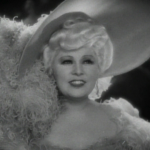 |
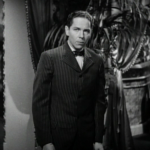 |
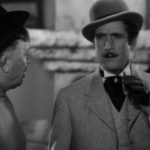 |
| Ruby Carter … Mae West |
The Tiger Kid … Roger Pryor |
Ace Lamont … Jon Miljan |
Proof That It’s Pre-Code
- I feel bad for listing all the best parts of the movie up front, but here we go. Some choice quotes:
“Abstinence makes the heart grow fonder.”
“I always liked French Art.”
“The wildest men make the best pets.”
“I have my moments, though they’re all weak ones.”
- And, as if a theme in Mae West’s movies, a woman getting slapped around who isn’t Mae West.
Belle of the Nineties: Up to No Good
Stick your chest out and put your hands behind you. Roll your eyes and toss out a one liner. Congratulations, you’re Mae West.
I talked about the phenomenon and woman that is West in my review of She Done Him Wrong a while back, and I don’t have a whole lot to add. Belle of the Nineties, made a year later under a much stricter enforcement of the Production Code, doesn’t add a whole lot either. It takes everything interesting and fun about West and dilutes it into mush.
The film’s plot, which I will graciously try to summarize for you in a paragraph, involves love between West’s Carter and a pugilist named ‘The Tiger Kid’. Due to complications, they split, but are eventually brought back together by way of a jealous dance hall owner who steals diamonds and makes bad bets and eventually works his way up to woman beater and piss poor arsonist.
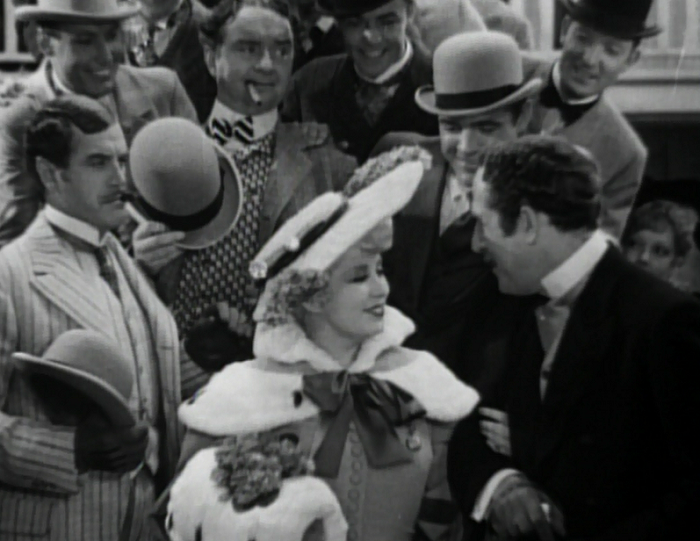
Mae West: the center of her own attention.
Mae West both stars and wrote the script for the picture. Her plotting abilities always remind me of that suggestion Homer gives in “The Simpsons” of what he thinks would make the character Poochie stand out: “Whenever Poochie’s not on screen, all the other characters should be asking “Where’s Poochie”?” West’s movies are structured in much the same way, though many times the audience is left to chime in as well.
Coming out late in 1934, most of West’s famous double entendres have been toned down and spread out. Unlike the gag-a-minute proceedings of most 30s comics, West’s movies seem to suffer from pacing problems galore. I’d say you could count the number of humorous lines she’s given on two hands, and the number of wisecracks other characters make on none.
With a joke-light enterprise, we’re instead treated to a great number of songs from Ms. West. Her voice isn’t terrible, but it’s not something that I think a sane person would give five musical numbers to in the course of an hour. Only one of these, a medley between West’s character and a nearby negro congregation that contrasts West’s feelings of guilt and the church’s take on salvation, gets any visual gusto or feels like it was tailor made for the film.
Speaking of that church, please don’t mistake this film for any radical tome to racial harmony even if the great Duke Ellington backs up West’s warbling. Ruby’s maid, Jasmine, is also black, but dumb and frivolous. She has a romance with a chauffeur that stands up and leaves the movie half way through, scattered among the other remains of plot that never seem to have much of a point.

Now let’s look at Mae West’s clothes. Yeah. Look at them.
Elsewhere, West’s fashionable gowns are built so that you imagine one deep breath and they would pop right off. She’s one of the most voluptuous women of the pre-Code era, easily, and all of her curves are underlined, bolded and in put in the fashion equivalent of 48-point font. This being a Paramount production, the styles and sets are impeccably decadent.
The film is a product of director Leo McCarey, a famous screwballer from the likes of Duck Soup and The Kid From Spain. Oddly enough, though he’s directed my favorite film (which definitely ain’t The Kid From Spain), McCarey’s style has never really impressed me. He obviously has a great technical playbook, using a variety of visual tricks, but his pace is languid, letting jokes relax for a beat or two and then moseying along. Considering how badly often the jokes are merely rye observations, this just kills everything.
I’ll always admire Mae West, the person, for what she tried to do and for the risque way she did it. But my experiences with her movies have yet to impress me. It’s too often a convoluted set up for a dirty punchline, and Belle of the Nineties doesn’t even consistently get that pay off. I’m willing to shift some of the blame onto the myriad of censorship problems the movie encountered, but at the end of the day, this movie does no one any favors.
Trivia & Links
- This movie was released in September, 1934, making it not technically pre-Code since full code enforcement began in July. However, since this one is included in Wikipedia’s List of Pre-Code films and still has a fair bit of raciness, I decided to cover it anyway. You can read the film’s history with censorship and its many cuts over at TCMDB.
- Pauline Kael in the New Yorker notes that the film isn’t as classy as West’s earlier work and not funny so much as tawdry, though Kael also has a much higher assessment of West’s vocal stylings than I do.
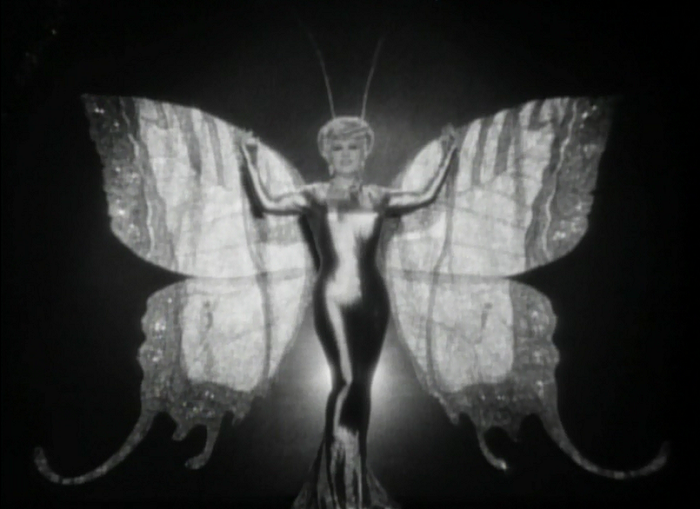
West’s introduction to the movie is showing her as a woman who is wildly popular for, uh, posing in front of backgrounds and looking like things. I guess that’s pretty… uh… something.
- Andre Sennwald in the New York Times is much more entranced (his original copy sounds as if it were covered in drool), enthusing:
A continuously hilarious burlesque of the mustache cup, celluloid collar and family entrance era of the naughty Nineties, it immediately takes its place among the best screen comedies of the year.
- As noted in Sennwald’s article and elsewhere, the film has been through the censorship mill. The film’s original ending apparently didn’t involve the insipid wedding bells and definitely implied things you weren’t to imply in late 1934. West herself also admitted that she made a lot of blue footage for the movie that she knew the censors would never let pass.
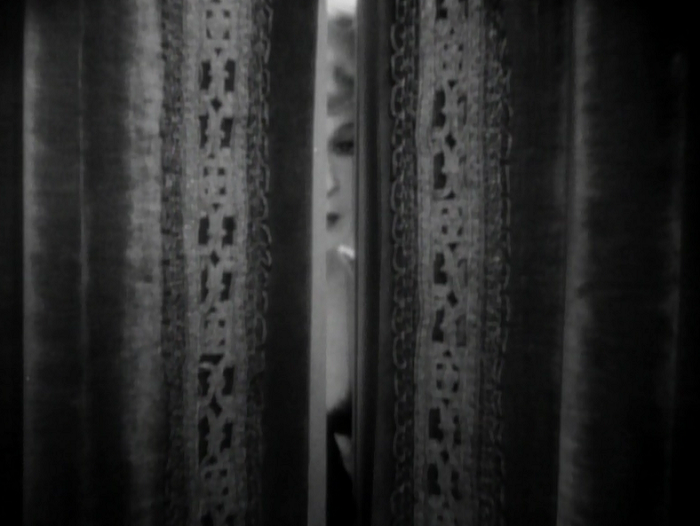
Mae West is watching you. And, let’s be honest, probably enjoying every minute of it.
- The film’s original title was Ain’t No Sin, which weren’t gonna fly under the Production Code Office.
- I talked about West’s gowns above, and here’s Pretty Clever Films with a rundown of her better fashions over the years.
- This film is available in the Universal Rarities Set, which is naturally composed of Paramount films. Also in it is another pre-Code, Million Dollar Legs (1932), with W.C. Fields. In the Balcony runs down the set.
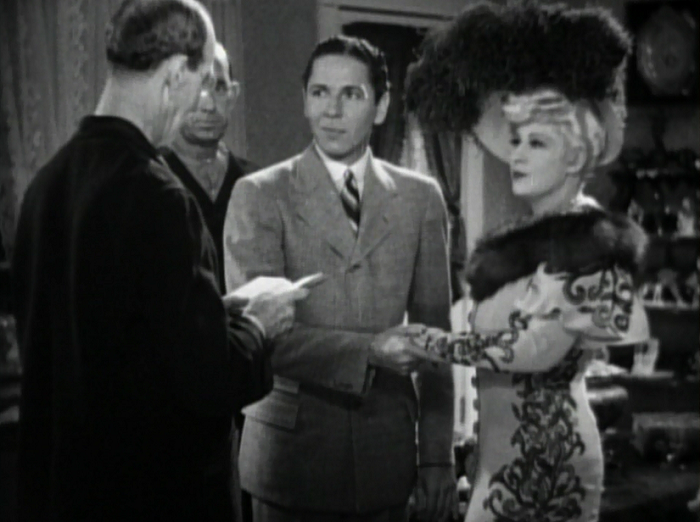
Tacked on and tacky. Great combo.
- Some excellent photos and posters for this one over at Dr. Macro, and here’s their Mae West annex for those weirdos who just like looking at Mae West.
- I listed most of the jokes I enjoyed up at the top, but I thought this one worked on more than just a couple of levels:
“Are you in town for good?”
“I’m in town, but not for good!”
Gallery
Hover over for controls.
Primary Sources
Thanks to Lantern, there are hundreds of issues of fan magazine and industry journals from the pre-Code era available for free. Here are some related articles; click on the ‘View Full Sized Image’ in the bottom right to view!
Awards, Accolades & Availability
- This film appeared in the Wikipedia List of Pre-Code Films.
- This film is available on Amazon and TCM, and can be rented from Classicflix.
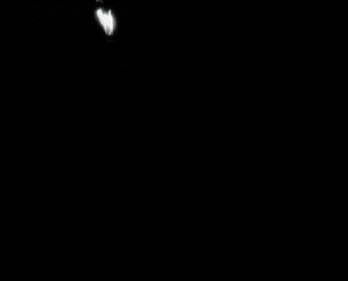 |
Comment below or join our email subscription list on the sidebar!Home | All of Our Reviews | What is Pre-Code? |

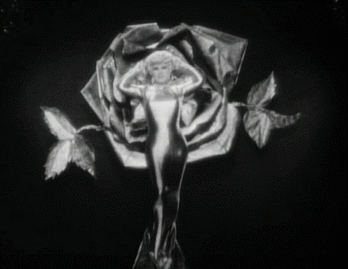
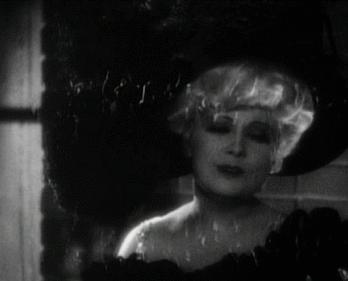
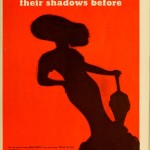
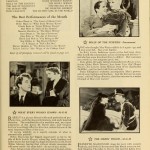
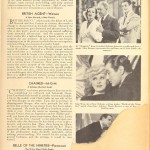
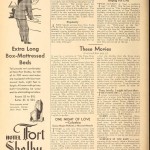
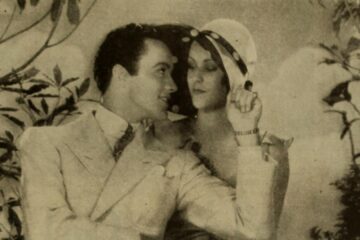


6 Comments
jameswharris · December 13, 2013 at 9:34 am
My favorite Mae West film has always been My Little Chickadee, which was not pre-code, but still seemed very daring for its time. I added Belle of the Nineties to my ClassicFlix queue.
Danny · December 14, 2013 at 10:34 am
Chickadee is my favorite, too, and I think it’s because West plus another comedian works much better than just West solo. Good luck when you watch this one, though. It’s a goofy kind of failure.
cbf111 · December 13, 2013 at 11:37 am
I love the layout you did for this film! Really impressive. I see you also mentioned Christina Stewart’s Mae West fashion comments at Pretty Clever Films’ site. Besides knowing her personally, I always enjoy her views on fashion design.
Danny · December 14, 2013 at 10:37 am
I always try and find unique or interesting visual links since so many people only talk about old movies in long, dull paragraphs (myself included). That article was definitely a delightful find!
brianpaige · December 16, 2013 at 8:31 pm
The irony is that My Little Chickadee is easily Fields’ worst Universal picture. Further irony looking at the film now is that West was disheartened with having to work with what she considered a 2nd rate B comedian, whereas it’s hard not to notice watching now that Fields is the infinitely better performer.
But yeah, Belle of the Nineties sucked. Watered down pseudo post Code West was not a pretty sight. It didn’t help that the male lead was some nobody either. At least in the first two we got a young Cary Grant and later at least Victor McLaglen in Klondike Annie.
Danny · December 18, 2013 at 8:30 am
Heh. I’m actually not a big fan of Fields, but I think West really can be much worse with her indulgences. The two combined worked better for me, but I have a lot more from both to catch in the meantime.
Comments are closed.